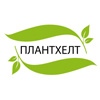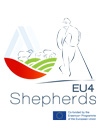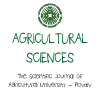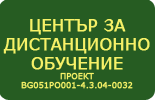Medicinal and essential plants
|
Course title: |
Medicinal and essential plants |
|
|
Course code: |
AFMEP |
|
|
ECTS: |
3 |
|
|
In-class hours |
Lectures: |
15 |
|
Laboratory work/Tutorials: |
15 |
|
|
Self-preparation hours |
Practical training: |
- |
|
Other: |
45 |
|
|
Total hours: |
75 |
|
|
Language: |
English |
|
|
Study cycle: |
BSc, MSc, PhD |
|
|
Semester: |
Winter & summer |
|
|
Faculty: |
Faculty of Agronomy |
|
|
Name of the lecturer(s): |
Prof. Ivan Yanchev, PhD |
|
|
Mode of delivery: |
Face-to-face, distance learning, combination of both |
|
|
Prerequisites: |
Botany, Plant physiology, Soil science and agrochemistry, Phytopathology, Entomology |
|
|
Learning outcomes of the course unit: |
The course “Medicinal and essential plants” plants provides the students with the opportunity to acquire contemporary, real and specific theoretical knowledge about the economic significance, origin, distribution, productive capabilities, biological requirements, growing and morphological peculiarities, systematics and economic properties of the regional varieties; their place in crop alternation, soil cultivation, fertilization, preparation and requirements about the sowing material and seedling production; the optimal terms for their sowing (planting); the schemes and norms of sowing (planting); cares during vegetation (weeds, diseases and pest control, handling of the growth and development of the crops, necessity of irrigation and its effectiveness. The course includes lectures and laboratory work. |
|
|
Course contents: |
Lectures - 15h 1. Rose of Kasanlik. Biological peculiarities and requirements, agrotechnic, harvesting and storage of the production – 2 hours 2. Lavandula and Dog rose. Biological peculiarities and requirements, agrotechnic, harvesting and storage of the production – 2 hours 3. Clary sage and Sage. Biological peculiarities and requirements, agrotechnic, harvesting and storage of the production – 2 hours 4. Peppermint, Lemon Balm and Basil. Biological peculiarities and requirements, agrotechnic, harvesting and storage of the production -– 2 hours 5. Fennel and Anise. Biological peculiarities and requirements, agrotechnic, harvesting and storage of the production – 2 hours 6. White Oregano and St.John’s wort. Biological peculiarities and requirements, agrotechnic, harvesting and storage of the production – 2 hours 7. Coriander and Caraway. Biological peculiarities and requirements, agrotechnic, harvesting and storage of the production – 2 hours 8. Valerian and Chamomile. Biological peculiarities and requirements, agrotechnic, harvesting and storage of the production – 1 hour
Laboratory work - 15h 1. Rose of Kasanlik. Morphological peculiarities, systematics, varieties; components of productivity; biometrical analysis – 2 hours 2. Lavandula and Dog rose. Morphological peculiarities, systematics, varieties; components of productivity; biometrical analysis – 2 hours 3. Clary sage and Sage. Morphological peculiarities, systematics, varieties; components of productivity; biometrical analysis – 2 hours 4. Peppermint, Lemon Balm and Basil. Morphological peculiarities, systematics, varieties; components of productivity; biometrical analysis -– 2 hours 5. Fennel and Anise. Morphological peculiarities, systematics, varieties; components of productivity; biometrical analysis – 2 hours 6. White Oregano and St.John’s wort. Morphological peculiarities, systematics, varieties; components of productivity; biometrical analysis – 2 hours 7. Coriander and Caraway. Morphological peculiarities, systematics, varieties; components of productivity; biometrical analysis – 2 hours 8. Valerian and Chamomile. Morphological peculiarities, systematics, varieties; components of productivity; biometrical analysis – 1 hour |
|
|
Recommended or required reading: |
1. Influence of predecessor and sowing rate on seed yield and yield components of coriander (Coriandrum sativum L.) in Southeast Bulgaria / Vania Atanasova Delibaltova et al.. // Bulgarian Journal of Agricultural Science, 18, 2012, N 3, p. 315-319. 2. Keranova, N. Assessment of the yields of essential oil crops in Bulgaria through mathematical approaches / N. Keranova. // Agricultural Science and Technology, 10, 2018, N 2, p. 140-143. 3. Nejatzadeh-Barandozi, F. et al. Influences growth index and yield in Dracocephalum (Dracocephalum moldavica L.) / F. Nejatzadeh-Barandozi, E. H. Shahvaladi, F. Gholami-Borujeni. // Bulgarian Journal of Agricultural Science, 21, 2015, N 2, p. 266-269. 4. Stanev, S. Evaluation of the stability and adaptability of the Bulgarian lavender (Lavandula angustifolia Mill.) sorts yield / S. Stanev. // Agricultural Science and Technology, 2, 2010, N 3, p. 121-123. 5. Stanev, S. et al. Lavender cultivation in Bulgaria – 21st century developments, breeding challenges and opportunities / S. Stanev, T. Zagorcheva, I. Atanassov. // Bulgarian Journal of Agricultural Science, 22, 2016, N 4, p. 584-590. 6. Tanova, K. et al. Influence of extracts from essential oil plants on the growth of Rhizoctonia solani Kuhn, agent of the sugar beet root rot / K. Tanova, R. Petrova. // Bulgarian Journal of Agricultural Science, 14, 2008, N 3, p. 309-312.. 7. Vasileva, Katya et al. Pycnidia fungi on Lavender / Katya Vasileva, Mariana Nakova. // Научни трудове АУ - Пловдив, 59, 2015, N 3, с. 33-40. 8. Zhekova, G. et al. Essential oil content and composition of Thyme "German winter" / G. Zhekova, A. Dzhurmanski, M. Nikolova. // Agricultural Science and Technology, 3, 2011, N 2, p. 123-125. 9. Zhekova, G. et al. Influence of different factors on tannins and flavonoids extraction of some thyme varieties representatives of thymol, geraniol and citral chemotype / G. Zhekova, D. Pavlov. // Agricultural Science and Technology, 4, 2012, N 2, p. 148-153. 10. Bulgarian rose oil of whete oil-bearing rose. Bulgarian rose oil of white oil-bearing rose / N. Nedkov et al.. // Bulgarian Journal of Agricultural Science, 15, 2009, N 4, p. 319-323. 11. Dikova, B. Tomato spotted wilt virus on some medicinal and essential oil-bearing plants in Bulgaria / B. Dikova. // Bulgarian Journal of Agricultural Science, 17, 2011, N 3, p. 306-313 12. Dikova, Bistra. Medicinal and essential oil-bearing plants new hosts of tomato spotted wilt virus in Bulgaria / Bistra Dikova. // Journal of Balkan Ecology, 15, 2012, N 2, p. 127-132. 13. Dikova, Bistra. Impatiens necrotic spot virus on essential oil-bearing and medicinal plants in Bulgaria / Bistra Dikova. // Journal of Balkan Ecology, 19, 2016, N 1, p. 21-28. 14. High-frequency in vitro direct shoots regeneration from axillary nodal and shoot tip explants of clary sage (Salvia sclarea L.) / T. Ghanbar et al.. // Bulgarian Journal of Agricultural Science, 22, 2016, N 1, p. 73-78. 15. Hristova, D. et al. Study on the influence of some biologically active substances over ethereal oil cultures - coriander / D. Hristova, D. Nenkova. // Bulgarian Journal of Agricultural Science, 18, 2012, N 1, p. 100- |
|
|
Planned learning activities and teaching methods: |
Lectures, presentations, tutorials, conversation, discussions, brainstorming |
|
|
Assessment methods and criteria: |
The lectures and the laboratory work will be held in the laboratories, on the experimental field and the demonstration field of the Crop Science Department, Faculty of Agronomy. During the learning process the students and the lecturer will actively discuss the material. The students are working individually under the lecturer supervision. The final grade consist of: • Theory exam. (test and discussion). (Origin, distribution, importance. Phenology and biological characteristics. Agro-technology). – 60% • Practical exam. (discussion). (Determination of the species by their morphological specifics) – 20% • Presentation of an individual project about selected industrial crop – 20% |
|
 - Events on the occasion of the 80th anniversary of AU
- Events on the occasion of the 80th anniversary of AU











